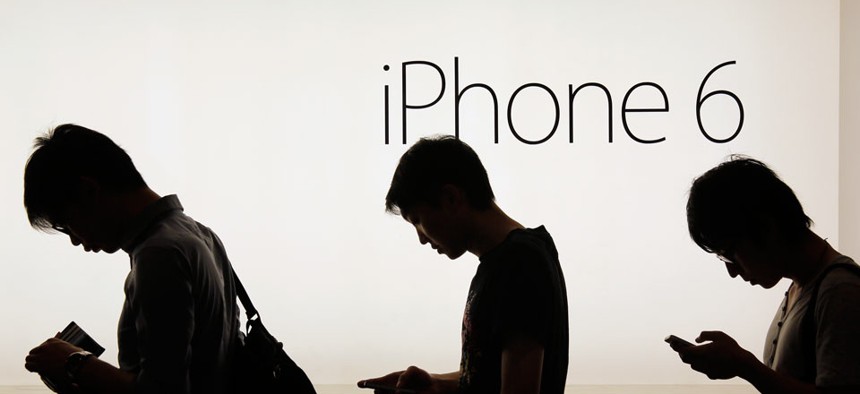The FBI's Secret House Meeting to Get Access to Your iPhone

Vincent Yu/AP
The administration argues that encryption is making it difficult for police to catch dangerous criminals.
The Obama administration is ramping up its campaign to force technology companies to help the government spy on their users.
FBI and Justice Department officials met with House staffers this week for a classified briefing on how encryption is hurting police investigations, according to staffers familiar with the meeting.
The briefing included Democratic and Republican aides for the House Judiciary and Intelligence Committees, the staffers said. The meeting was held in a classified room, and aides are forbidden from revealing what was discussed.
It's unclear whether the FBI is planning a similar briefing for Senate aides.
Earlier this month, FBI Director James Comey gave a speech arguing that the "post-Snowden pendulum has swung too far," and that police are often now unable to obtain the information they need for an investigation—even after getting a warrant. As a result, child predators, terrorists, and other criminals could go free, he warned.
The speech was prompted by new policies from Apple and Google to provide default encryption on their phones, making it impossible for the companies to give police access to photos, contact lists, and other data stored on devices.
"The FBI has a sworn duty to keep every American safe from crime and terrorism, and technology has become the tool of choice for some very dangerous people," Comey said in the speech at the Brookings Institution.
The FBI chief urged Congress to enact legislation to require tech companies to create a way for police to spy on their users.
A 1994 law, the Communications Assistance for Law Enforcement Act, forces telephone companies to build surveillance technologies into their networks to allow law enforcement to install wiretaps. But the law hasn't been updated and doesn't cover new networks and devices.
Comey called for Congress to revise the law to create a "level playing field" so that Google, Apple, and Facebook have the same obligation as AT&T and Verizon to help police.
But the plan faces fierce opposition from tech companies and privacy advocates. They warn that any backdoor for law enforcement could also be exploited by hackers. Forcing U.S. companies to build insecure products will make them less attractive in foreign markets, they claim.
The critics also argue that police often have other ways of legally obtaining information, such as getting warrants for data stored on company servers.
Convincing Congress to enact Comey's proposal will be a tough challenge. In the wake of the Edward Snowden leaks, most lawmakers seem more interested in reining in government surveillance than expanding it.



